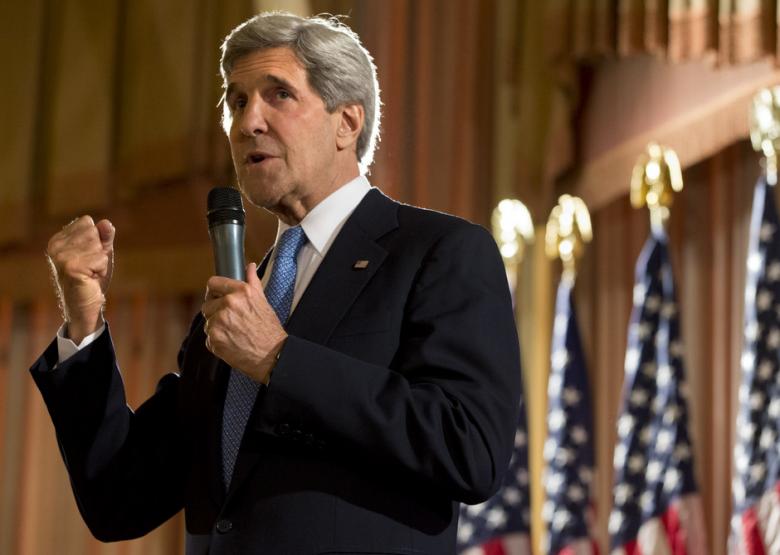(John Kerry | Source: AFP)
Initially it appeared that U.S. Secretary of State John Kerry’s peace initiative was harmless. Although few Israelis, Palestinians or Americans expected it to accomplish anything, it was hard to make the case that it would do any damage.
No more.
And not just because the Israeli government keeps announcing the building of new settlements. And not just because Prime Minister Binyamin Netanyahu continues the litany of propaganda attacks on Palestinians, including the charge that the 23-year old “Arab Idol” winner, Gaza singer Mohammed Assaf, is a threat to Israel because he nostalgically sings about towns inside the 1967 lines.
| The secretary of state can’t permit any move by anyone that will “nudge away Netanyahu.” Not by us. Not by anyone. |
All that is to be expected, unless one actually believes that Netanyahu has undergone the conversion that Yitzhak Rabin did once he decided to negotiate with the Palestinians. But who believes that?
No, the evidence that the Kerry initiative is not harmless but harmful comes not from anything Netanyahu did or says but from Kerry himself.
Last Thursday, Kerry and National Security Adviser Susan Rice met for 90 minutes at the White House with representatives of American Jewish organizations to fill them in on latest developments and to assure them that the United States has Israel’s best interests at heart.
That is not surprising either considering that it comes from an administration which has as its credo that there must be, as Vice President Joe Biden repeatedly says, “no daylight, no daylight” between U.S. and Israeli policies. Honest broker, hardly.
According to JTA, the Jewish news service, on Thursday Kerry told the leaders of the 16 Jewish organizations that constitute the Israel lobby (the most significant of which is AIPAC, the American Israel Public Affairs Committee) that he was “nervous about the potential for failure, warning of circumstances—for instance, pressures on Netanyahu—that could undermine them.” Then Kerry “expressed frustration with the European Union’s new policy of not giving grants and prizes to Israeli enterprises in occupied areas, saying it was the sort of move that could nudge away Netanyahu.”
Think about that. Kerry is worried about Netanyahy feeling pressured, particularly by the EU’s decision not to fund projects in the occupied territories. Why? Given that the European Union does not recognize Israeli sovereignty in the occupied areas, why should it fund Israeli projects there?
Of course the EU’s decision enraged Netanyahu and the Israeli right in general because they believe that the West Bank is every bit as Israeli as Tel Aviv. How dare the EU make such distinctions?
The United States should welcome this kind of pressure on Netanyahu, especially because it doesn’t come from the United States (and therefore cannot damage the Democratic party in the eyes of donors). Unfortunately Kerry is so determined to achieve some sort of personal success with his peace initiative, he opposes any action that will upset Netanyahu. He can’t permit any move by anyone that will “nudge away Netanyahu.”
Not by us. Not by anyone.
How then does he expect negotiations to succeed? Does he not understand that Israeli-Palestinian negotiations by definition have as their goal taking territories Netanyahu wants to hold on to and transferring them to the Palestinians? That is what the negotiations are about, described as long ago as November 1967 in United Nations Resolution 242 (endorsed by Israel) as the “land for peace” formula.
Either Kerry thinks he can slowly entice Netanyahu to an agreement without “nudging” him until Netanyahu is trapped and can’t turn back or he thinks that peace can be achieved without Israel relinquishing the occupied territories.
Either way, he is wrong.
As for Netanyahu, he knows exactly what he is doing.
By pretending to pursue peace, he has gotten the United States to lay off the settlements issue and even to oppose actions by others who want to address it. So long as he can keep the negotiations charade going, he can keep grabbing land and building, ensuring that, in the end, Kerry’s legacy will not be achieving peace but securing the settlement enterprise once and for all.
Supporting peace requires opposing this “process.”
M.J. Rosenberg is a Special Correspondent for The Washington Spectator. He was most recently a Foreign Policy fellow at Media Matters For America. Previously, he spent 15 years as a Senate and House aide. Early in his career he was editor of AIPAC’s newsletter Near East Report. From 1998-2009, he was director of policy at Israel Policy Forum. Follow him @MJayRosenberg.







0 Comments